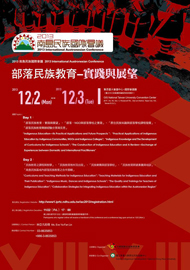
-
Time:
- December 2-3, 2013 (International Conference)
-
Location:
- GIS National Taiwan University Convention Center
(B1F., No.85, Sec. 4, Roosevelt Rd.,Da-An Dist., Taipei City 100,Taiwan R.O.C.)
-
Telephone::
- +886-3-863-5851
-
Telefax:
- +886-3-863-5850
- E-mail:
- laibalu@hotmail.com
- Contact Person:
- Kui
Origin
1.Origin
The Council of Indigenous People, Executive Yuan continues to implement policies which promote international Austronesian exchanges. To enhance cultural and scientific exchange, the council brings indigenous representatives of local industry, government and science together with representatives of other countries during this two-day International Austronesian Conference. The Council wishes to promote a collaborative relationship between the indigenous people of Taiwan and Austronesia, and trusts that indigenous people of Taiwan can become a good example within the Austronesian region for how cultural heritage and history is passed on. A further purpose of the conference is to enhance the visibility and position of the indigenous people of Taiwan on a global level.
2.Background
In 1997 the clause of the constitution regarding respect for indigenous multiculturalism and people's right to indigenous culture, education and customs has been amended. This was followed by the two laws of "Basic Law of Indigenous Peoples" and the "Education Law of Indigenous People." Both laws stipulate that indigenous education must include indigenous culture, it must be adapted to indigenous students, and that it must be gradually incorporated within the governmental policy agenda.
Apart from indigenous language courses, proficiency certificates, maintenance of indigenous schools, preservation of written accounts, and the announcement of important indigenous policies, recently indigenous education also started to turn its attention to the establishment of new indigenous schools. To develop a more complete indigenous education and teaching system these new schools must be established. The purpose of this conference is to thoroughly present indigenous culture and to illustrate how indigenous knowledge can be passed on to future generations. This international conference has been planned for many years, and we are very happy to finally officially launch it now. There exist three indigenous schools in Taiwan at the moment: the Amis Cilangasan Indigenous School, the Puyuma Huahuan Indigenous School, and the Paiwan Indigenous School situated in Dawu Mountain area. This conference will help us get closer to our plan which consists in the establishment of three indigenous schools: the Atayal, the Bunun, and the Yami Indigenous Schools.
Many preparations have been done to make this conference come true. Indigenous leaders, local scholars, and experts of indigenous people of Austronesia have been invited to discuss and share their thoughts and experience about indigenous education. Thus, the aim of the conference is to apply the knowledge of these experts for future indigenous school building projects. The word should be spread out that for indigenous people living within Austronesia, indigenous education is essential. The Maori education system of New Zealand, for instance, is a very good example for how the important a role indigenous education and culture gained recently. Since the indigenous people of Taiwan belong to"the indigenous people of Austronesia", education system of other Austronesian indigenous groups can be an ideal reference.
We hope that with the present international conference we can get one step closer to the establishment of the three indigenous schools. National and international scholars familiar with indigenous education, important indigenous leaders and other experts of indigenous school establishment will be all present to discuss their ideas, share their thoughts and to assimilate knowledge on indigenous education and indigenous schools.
3.Objectives:
| (1) To promote the image of indigenous people of Taiwan and to improve their status within the Austronesian region. |
| (2) To set up a good academic debate platform and to promote collaborative inter-nation relationships. |
| (3)To construct indigenous education, to familiarize with its practice and to put together future policies. |
| (4) To improve society' opinion on themes related to indigenous education. |
| (5) To bring indigenous representatives of industry, government and science together and therefore promote cultural and scientific exchange. |
Copyright © 2013 International Austronesian Conference. All Rights Reserved.
